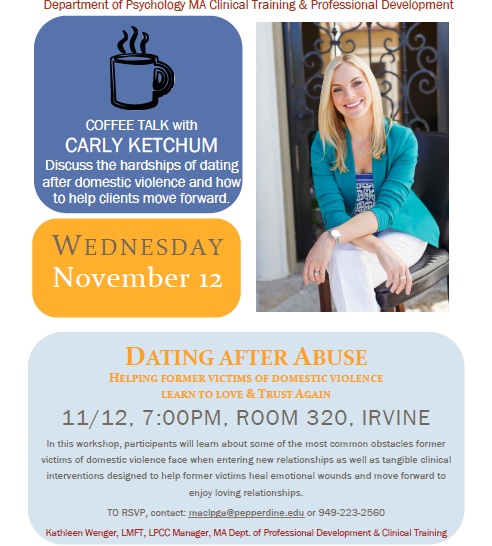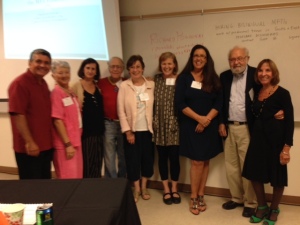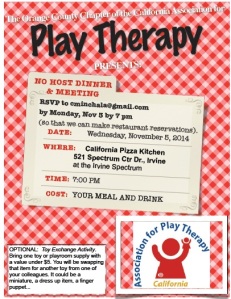Month: October 2014
The Greater Los Angeles MFT Consortium: Building the Future of the MFT Profession
In the photo, Jose Luis of Phillips is on the far left. Olivia Loewy, Executive Director of CA-AAMFT, is on the far right. Standing next to Jose Luis is Marika Zaharkiv, and next to her is Carol Bishop, one of our alumna who is Tarzana Treatment Center. Next is Stan Charnofsky, Director of the MFT Program at Northridge, Clarence Hibbs, former MACLP Program Director, Rebecca Reed MA Clinical Training and Prof Dev. Coodinator, Kathleen Wenger, Manager MA Clinical Training and Development also Founding Chair of the OC MFT Consortium, Francie Neeley, Faculty and former MACLP Program Director.
The Greater Los Angeles MFT Consortium was founded when the BBS decided that the schools and educational programs should have greater control over the experiential training of pre-licensed MFT Trainees. Back then, training for students in practicum was all over the map. By bringing together supervisors, agency directors and educators, the Consortium was able to come up with recommendations to the Board that satisfied all or most of the stakeholders.
The Consortium unites the regional consortia of MFT academic programs throughout California with the mission of enhancing the quality of clinical training to MFT students. MFT educators examine the various protocols schools use in preparing students for practicum training and collaborate with the community clinical sites that provide the direct clinical experience and supervision to the students. These regional consortia have been “effective in promoting the quality of practicum training for students pursuing a career in marriage and family therapy [and] in advancing the integrity of the profession and the participation of its members in local and state governance” There are now 8 Consortia throughout the state of CA and the Orange County Consortia led the way, by being the very first in the state! Kathleen Wenger, LMFT, LPCC is the founding Chair of the OC MFT Consortium and continues to Co-chair it today (135 meetings over 24 years!)
As this year marks the Greater Los Angeles MFT Consortium’s 20th anniversary, the September 12 meeting had “Celebrating Twenty Years of Collegiality” as its theme. The event opened with a retrospective on the Consortium’s founding, entitled “Establishing a Network of MFT Schools: Events and Contributors” and presented by Consortium co-chair Jose Luis Flores. Following a celebratory lunch, Flores was joined by fellow Consortium co-chair Michele Shepherd as well as Lisa Wolfe for a presentation on the history of the Consortium, “Timeline and Chronicle of the Consortium: 20 Years of Collaboration.” After this review of the past, the event shifted to a look ahead at the possible future of the MFT profession with Sara Kashing’s “The Future of the MFT Profession: A Projective View.” Olivia Loewy and Ben Caldwell concluded the meeting with “Expanded MFT’s Role in the Health Care System: Five Forces Shaping Our Future.” Following this, the formal part of the meeting concluded but attendees continued to mingle and network, reflecting on the MFT profession’s accomplishments over the past twenty years and the bright future that lies ahead for it.
Addiction and Technology Conference at Pepperdine
Pepperdine University, Wilburn Auditorium
Drescher Graduate Campus
This conference will focus on promoting best clinical practices and increasing the awareness of clinical providers around issues related to advances in technology.
Presentations by four renowned experts, include:
- Closer Together: Further Apart – The Effect of Digital Technology on Addiction, Psychotherapy and our Daily Lives
Robert Weiss, LCSW, CSAT-S
Elements Behavioral Health – Sr. Vice President of Clinical Development - Put That Down and Talk to Me: How Digital Drama is Redefining Mind and Body Wellness in Psychotherapy
Pamela Peeke, MD, MPH, FACP
Elements Behavioral Health – Senior Science Advisor - Teens Online: What Should we (not) be concerned about?
Jaana Juvonen, PhD
UCLA, Professor of Psychology - Problematic and Addictive Computer/ Video Gaming: Assessment and Treatment
Kenneth Woog, PsyD
Pepperdine University, Associate Director – PRYDE Program
Cost: $99 General Admission / $79 for Students – Includes lunch and snacks throughout the day.
Conference Learning Objectives:
- Discuss a multigenerational view of technological change
- Discuss alternate views of ‘life online’ beyond addiction and pathology
- List 2-3 new emerging technologies helpful toward improving treatment outcomes
- Identify the seminal studies outlining potentially destructive behaviors that occur as a consequence of inappropriate use of digital technology
- List five self-destructive behaviors which can occur as a result of the misuse of digital technology
- Discuss specific limits and boundaries that could be applied to the use of digital technology in the client and mental health professional’s daily life to promote health
- Identify risks associated with electronic communication among teens.
- Identify the impact of problematic and addictive computer/video gaming the health, academic, occupational and social functioning of adolescents and young adults.
- Identify methods of assessing and treating problematic and addictive computer/video gaming.
OC CALAPT Dinner Meeting, Nov. 5, Irvine
The Orange County Chapter of the California Association for Play Therapy will be having a No Host Dinner Meeting on Wednesday, November 5, 2014, 7:00 pm. We will be meeting at California Pizza Kitchen, 521 Spectrum Ctr Dr. Irvine at the Irvine Spectrum. Join us for a networking dinner to share information and experiences with each other. There will be no speaker and no CEUs. The cost is the purchase of your own food and beverages.
CALPCC Orange County Networking Meeting
CALPCC’s Orange County Regional Network is excited to announce that Balboa Horizons will host the 2nd Regional Network Event in Orange County on Wednesday, November 5th from 6:30 pm-8 pm.
The address of Balboa Horizons is:
129 Cabrillo Street, Costa Mesa
We will provide food for the event, and the cost will be approximately $10 for the food. There was a lot of excitement regarding our first Regional Network meeting. If you did not get a chance to attend the first event, we look forward to meeting you at this one.
Please RSVP on the following link so we can know how much food to order.
If you have any questions, please contact Dr. David Adams at dr.david@um.att.com
Quiz Your Mind!
MACLP Students, Test Your Knowledge on MFT and BBS Requirements!
1. If my supervisor’s license lapses, I will not be credited for
hours received during the period of the lapse. (True or False?)
2. I may apply for my intern registration number from the BBS
before I graduate as long as I have completed all practicum
requirements. (True or False?)
3. If I do not complete my requirement for practicum hours by
the end of the semester, I can make up the hours during the
break and in the following semester. (True or False?)
4. Once I receive my degree from Pepperdine, I will have com-
pleted all of the educational requirements toward MFT licen-
sure. (True or False?)
5. Time spent in the classroom for Practicum class (662) may
be counted on my weekly log (True or False?)
Scroll down for the answers when you’re ready!
1. True
2. False
3. True
4. False
5. False
GSEP Distinguished Lecture Series Welcomes Certified Eating Disorder Specialist Rebecca Cooper
The Margaret J. Weber Distinguished Lecture Series: Leaders Inspiring Change
Wednesday, November 12, 2014 – 7pm-9pm
Rebecca Cooper, Author/Founder, Rebecca’s House Eating Disorder Treatment Programs
“Current Eating Disorder Technological Research and Treatment Implications”
Pepperdine University West Los Angeles Graduate Campus – 2nd Floor, Room 203

Eating disorders, diabetes and obesity have become an international epidemic. The reasons are many, but there is a plethora of new scientific research that is helping us to understand this phenomenon.
Scientific studies show that the cyclical binge eating and restricting (i.e. dieting) can alter the opioid receptors in the brain. Dieting sets people up to disconnect from their appetite, create unhealthy eating behaviors and changes brain chemistry. 35% of normal dieters progress into eating disorders, obesity, and disordered eating.
Genetic research has identified the gene responsible for the number of dopamine receptors. For people with a deficiency in the amount of dopamine receptors, different types of foods are used to compensate for this deficiency and become addictive. This can make any type of recovery challenging because most are unaware of the underlying food addiction.
Using functional MRI, we now know that some foods affect the dopamine pathways in the brain. It has been shown that these foods exhibit the same activity in the reward system of the brain as alcohol or drugs (Avena, Rada, & Hoebel, 2008). New technological research is expanding this concept. Alcoholics are most susceptible to sugar addiction because alcohol is assimilated in the body as sugar. Some research findings go so far as to say “sugar is a gateway drug.” Another study shows that sugar can be as addictive as cocaine for some people.
The presentation will highlight current research, statistics, assessment tools, brain imaging charts and case studies showing the different reasons for the disconnection from appetite and self. Methods to reestablish a sense of a healthy self and recovery from eating disorders will also be presented.
Rebecca Cooper is an international speaker whose mission is to create awareness of disordered eating in all forms. She regularly appears on television, webcasts, professional conferences and radio. Ms. Cooper created the first transitional living residence for eating disorders, in addition to Rebecca’s House Eating Disorder Treatment Programs in Orange County, CA. She is a licensed therapist and certified eating disorder specialist and iaedp approved supervisor. She authored the Diets Don’t Work® book, CDs, DVDs, Eating Disorder Workbooks, and numerous published articles. Her eating disorder program is used throughout the country at treatment centers and by therapists.
Fall 2014 Psychology Blog and Article Rundown
Some interesting articles and blog posts from the past couple of months! ~ Andrew Walker, M.A.
How “Foodies” Were Duped Into Thinking McDonald’s Was High-End Food – “Research has found that when you tell people that what they are eating or drinking is a high-end product, they won’t just say that it tastes better than a cheaper product — their brains will actually experience it as better.” (NPR)
Super-Intelligent Humans are Coming – “The genetic study of cognitive ability suggests that there exist today variations in human DNA which, if combined in an ideal fashion, could lead to individuals with intelligence that is qualitatively higher than has ever existed on Earth.” (Nautilus)
Is Gluten Causing Your Depression? – “In celiac patients, depression and anxiety symptoms have been linked to gluten consumption. But what about in non-celiac patients? Could gluten be causing anxiety and depression in folks without celiac disease?” (Evolutionary Psychiatry)
Can Video Games Fend Off Mental Decline? – “Gazzaley, however, is something of an outlier. His work commands respect from even the harshest critics. He spent five years designing and testing the sort of game play I had just experienced, and he found that it does indeed appear to prompt older brains to perform like ones decades younger.” (New York Times Magazine)
Here Are the Psychological Reasons Why an American Might Join ISIS – “McCain grew up in Minnesota, was a basketball player, and wanted to be a rapper. Friends describe him as a high school “goofball” and “a really nice guy.” So what could have made him want to join the ranks of other Americans drawn towards militant Islam?” (Mother Jones)
Conference Tips and Reflections from the 2013 Evolution of Psychotherapy Conference
The Evolution of Psychotherapy Conferences takes place in Anaheim every four years and includes renowned experts from around the world. Missed it last year? You don’t have to wait until 2017 — the entire conference and individual sessions are available at the Erickson Foundation’s online store. We have some reflections from Pepperdine faculty member Stephen Sultanoff, Ph.D., about the most important takeaways from the last Evolution conference — including tips that can apply to your attendance at any other conference!
by Stephen Sultanoff, Ph.D.
The Evolution of Psychotherapy conference is the richest and best conference in the field of psychology. My first piece of advice is: do not miss it next time. I have attended all 7 held in the US and continue to be impressed by the quality and I continue to learn.
Tips.:
Buy the conference registration as soon as it becomes available. This gives you the best rate.
Study the conference syllabus and become familiar not only the speakers but with the presentation options (workshops, keynotes, clinical demonstrations, conversation hours, panel discussions, etc.).
Pace yourself and be prepared for lines to get food. Bring snacks and drinks.
Choose wisely. There are many programs and you cannot attend them all. In fact you most likely will purposely skip programs so that you have some “down time.”
Feel free to leave a session if it is not meeting your needs.
Stretch yourself both physically with plenty of rest periods but also attend sessions outside of your area. I knew nothing of hypnotherapy or EMDR until I saw them presented at the conference.
Thoughts about this past conference:
For students, I think the biggest message came from Scott Miller and David Burns. Psychotherapy training has all but disappeared. Be sure to find ways to get experiential, deliberate practice training if you want to develop into a skilled therapist. In addition be receptive to asking your clients for feedback. See Miller’s website for tools. Be open to self-examination.
Miller, Burns, and Don Michenbaum all discuss “what makes a good or even master therapist.” Students should pay close attention if they want to become proficient.
Technology is expanding faster than the ethics, laws, and clinical concerns. Be sure to consider the ramifications of technology including being accessible (or not) by cell phones, use of email (and the clinical as well as security issues that may entail), online billing, online therapy, electronic therapy crossing state lines (where you might not be licensed), etc.
Western Psychological Association 2015 Convention Call for Proposals
WPA’s 2015 convention (their 95th annual one!) takes place in Las Vegas from April 30 – May 3. Save the date! The deadline for proposals is November 17. Go here for the full call for proposals and check out some tips for crafting your abstract.





